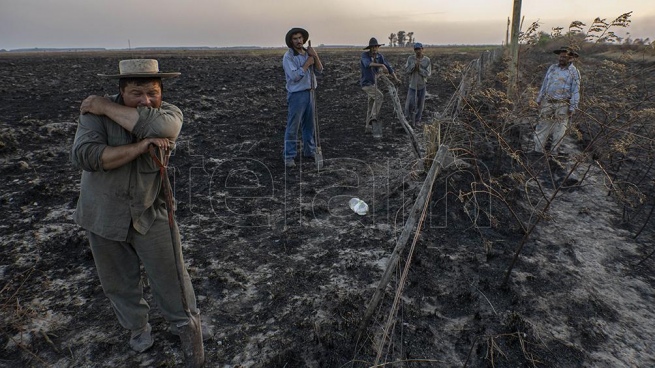The national government is working on an emergency plan for livestock in Corrientes, which includes the transfer of animals in the context of the fires that are registered in the province, and which will include an “immediate contingency” plan, and another “medium and long term” that will involve other chains and will point to the productive recovery.
This was announced by the Minister of Agriculture, Livestock and Fisheries, Julián Domínguez, who remarked that “The problem of Corrientes becomes a national problem because it is going to impact all Argentine livestock, in the supply of animals, lack of calves and the alteration of the reproductive process of animals in the 2022-2023 cycle.”
From the city of Mercedes in Corrientes, the minister announced that he is working on an “immediate contingency plan for livestock and a medium-term plan for the rest of the chains,” and that progress is also being made in “a five-year medium-long-term plan for productive recovery, with INTA and Senasa and in coordination with the Ministry of Production of the province of Corrientes.”
“The Corrientes problem becomes a national problem because it is going to have an impact on all Argentine livestock.”
He indicated that the livestock in this province has 4.6 million heads and represents “more than 10% of the total livestock and 20% of the wombs.”
“We had a work program that had to be modified. Of the 300,000 hectares burned -which were three weeks ago- today we are close to 800,000, more than 12% of the provinceespecially affecting the livestock area,” Domínguez said in statements made to El Destape Radio on Monday.
He pointed out that the situation of provincial livestock that covers 27,000 producers, of which 80% are SMEs“complies more than 1.5 million heads that were already lacking in Argentina”.
“Today we are close to 800,000 hectares burned, more than 12% of the province.”
“The fields will not be able to feed the animals for the next two productive campaigns”, indicated Domínguez, who added that in such cases it is when “forced sales of animals are decided because they have nowhere to be, with all the alteration of the productive cycle.” For this reason, he pointed out, the immediate objective is “to find a solution for the global displacement of livestock” and “accompany the producer so that it continues to be so”.
He also said that the situation can “act as a limiting factor, complicating sales in international markets,” for which he stressed that “work is being done to find a response model that allows us to continue certifying the quality of Argentine production.”
“The fields will not be able to feed the animals for the next two productive campaigns.”
He also reviewed the impact of the fires on rice production, which was “anchored” in a province with 60% surface water, and that “today it is 10%”; and also mentioned the forestry, citrus, yerbatera and tobacco chains. “There is a total impact and a decrease in the productive capacities of this province,” Domínguez asserted.

















